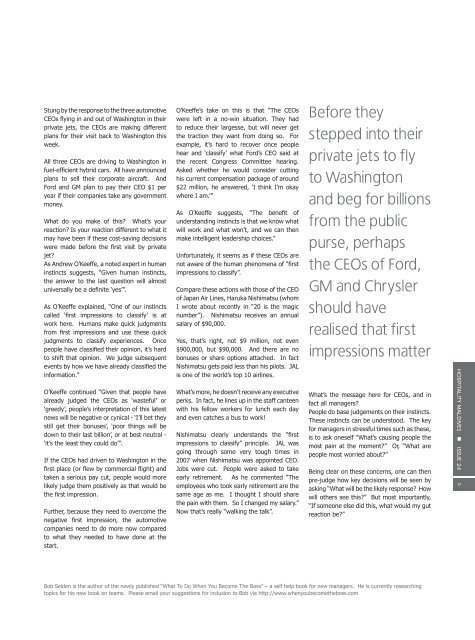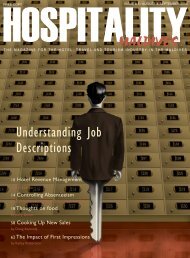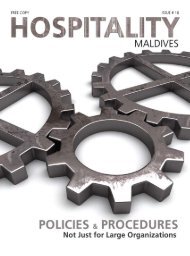Untitled - Hospitality Maldives
Untitled - Hospitality Maldives
Untitled - Hospitality Maldives
Create successful ePaper yourself
Turn your PDF publications into a flip-book with our unique Google optimized e-Paper software.
Stung by the response to the three automotive<br />
CEOs flying in and out of Washington in their<br />
private jets, the CEOs are making different<br />
plans for their visit back to Washington this<br />
week.<br />
All three CEOs are driving to Washington in<br />
fuel-efficient hybrid cars. All have announced<br />
plans to sell their corporate aircraft. And<br />
Ford and GM plan to pay their CEO $1 per<br />
year if their companies take any government<br />
money.<br />
What do you make of this What’s your<br />
reaction Is your reaction different to what it<br />
may have been if these cost-saving decisions<br />
were made before the first visit by private<br />
jet<br />
As Andrew O’Keeffe, a noted expert in human<br />
instincts suggests, “Given human instincts,<br />
the answer to the last question will almost<br />
universally be a definite ‘yes’”.<br />
As O’Keeffe explained, “One of our instincts<br />
called ‘first impressions to classify’ is at<br />
work here. Humans make quick judgments<br />
from first impressions and use these quick<br />
judgments to classify experiences. Once<br />
people have classified their opinion, it’s hard<br />
to shift that opinion. We judge subsequent<br />
events by how we have already classified the<br />
information.”<br />
O’Keeffe continued “Given that people have<br />
already judged the CEOs as ‘wasteful’ or<br />
‘greedy’, people’s interpretation of this latest<br />
news will be negative or cynical - ‘I’ll bet they<br />
still get their bonuses’, ‘poor things will be<br />
down to their last billion’, or at best neutral -<br />
‘it’s the least they could do’”.<br />
If the CEOs had driven to Washington in the<br />
first place (or flew by commercial flight) and<br />
taken a serious pay cut, people would more<br />
likely judge them positively as that would be<br />
the first impression.<br />
Further, because they need to overcome the<br />
negative first impression, the automotive<br />
companies need to do more now compared<br />
to what they needed to have done at the<br />
start.<br />
O’Keeffe’s take on this is that “The CEOs<br />
were left in a no-win situation. They had<br />
to reduce their largesse, but will never get<br />
the traction they want from doing so. For<br />
example, it’s hard to recover once people<br />
hear and ‘classify’ what Ford’s CEO said at<br />
the recent Congress Committee hearing.<br />
Asked whether he would consider cutting<br />
his current compensation package of around<br />
$22 million, he answered, ‘I think I’m okay<br />
where I am.’”<br />
As O’Keeffe suggests, “The benefit of<br />
understanding instincts is that we know what<br />
will work and what won’t, and we can then<br />
make intelligent leadership choices.”<br />
Unfortunately, it seems as if these CEOs are<br />
not aware of the human phenomena of “first<br />
impressions to classify”.<br />
Compare these actions with those of the CEO<br />
of Japan Air Lines, Haruka Nishimatsu (whom<br />
I wrote about recently in “20 is the magic<br />
number”). Nishimatsu receives an annual<br />
salary of $90,000.<br />
Yes, that’s right, not $9 million, not even<br />
$900,000, but $90,000. And there are no<br />
bonuses or share options attached. In fact<br />
Nishimatsu gets paid less than his pilots. JAL<br />
is one of the world’s top 10 airlines.<br />
What’s more, he doesn’t receive any executive<br />
perks. In fact, he lines up in the staff canteen<br />
with his fellow workers for lunch each day<br />
and even catches a bus to work!<br />
Nishimatsu clearly understands the “first<br />
impressions to classify” principle. JAL was<br />
going through some very tough times in<br />
2007 when Nishimatsu was appointed CEO.<br />
Jobs were cut. People were asked to take<br />
early retirement. As he commented “The<br />
employees who took early retirement are the<br />
same age as me. I thought I should share<br />
the pain with them. So I changed my salary.”<br />
Now that’s really “walking the talk”.<br />
Before they<br />
stepped into their<br />
private jets to fly<br />
to Washington<br />
and beg for billions<br />
from the public<br />
purse, perhaps<br />
the CEOs of Ford,<br />
GM and Chrysler<br />
should have<br />
realised that first<br />
impressions matter<br />
What’s the message here for CEOs, and in<br />
fact all managers<br />
People do base judgements on their instincts.<br />
These instincts can be understood. The key<br />
for managers in stressful times such as these,<br />
is to ask oneself “What’s causing people the<br />
most pain at the moment” Or, “What are<br />
people most worried about”<br />
Being clear on these concerns, one can then<br />
pre-judge how key decisions will be seen by<br />
asking “What will be the likely response How<br />
will others see this” But most importantly,<br />
“If someone else did this, what would my gut<br />
reaction be”<br />
Bob Selden is the author of the newly published “What To Do When You Become The Boss” – a self help book for new managers. He is currently researching<br />
topics for his new book on teams. Please email your suggestions for inclusion to Bob via http://www.whenyoubecometheboss.com
















